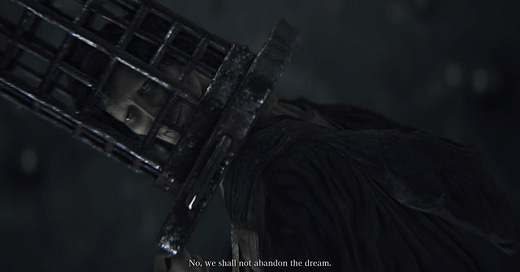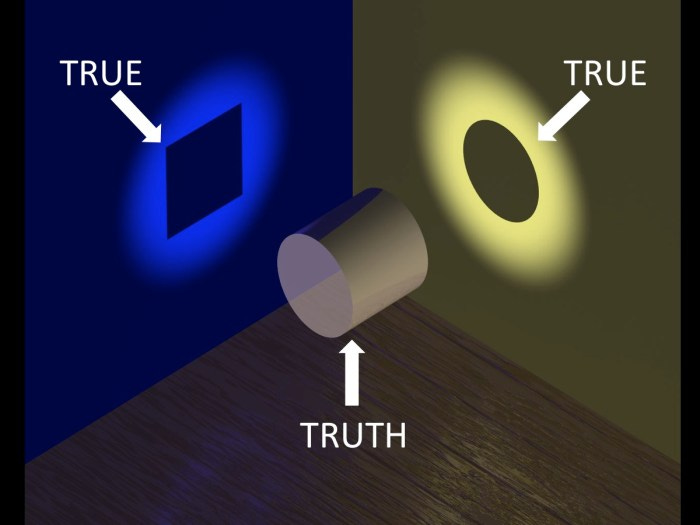The world is a theophany! An encounter with God! From a certain point of view at any rate. Some take this point of view quite far. Such as the Aghori, who declare everything perfect and sacred, and to really make the point, spend time in charnel grounds, smear themselves with cremation ashes, and fashion themselves cups out of skulls. Because it’s all God in the end. According to them.
While the Aghori take it too far (do they really?), one can see the hand of God in many things. Why, if the Aghori see God in corpses, it occurs to me that I am allowed to say I see divinity in videogames. One particular game that is definitely sacred or mystical because of sheer depth of insight, is auteur Hidetaka Miyazaki’s Lovecraftian masterpiece Bloodborne (you should play it). I may have a lot to say about this game at some point, but for now, I want to focus on a specific boss fight in it that occurs near the end of the game. So spoilers, I suppose.
The boss fight occurs in the end area, the Nightmare of Mensis. It is against the author of the Nightmare, named in game as Micolash, Host of the Nightmare. You can watch the boss fight below, if you want:
What could possibly be so interesting about this? It is in who Micolash is: a guy who created a nightmare and runs around ranting with a cage on his head. And it is in what he says:
"Ahhh Kos… or some say Kosm. Do you hear our prayers?
...
“As you once did for the vacuous Rom, grant us eyes, grant us eyes. Plant eyes on our brains, to cleanse our beastly idiocy.”
...
Let us sit about, and speak feverishly. Chatting into the wee hours of…
...
New ideas, of the higher plane!
It is also in the description of the cage he wears, the Mensis Cage which is an item you can equip:
The School of Mensis controls the Unseen Village.
This hexagonal iron cage suggests their strange ways. The cage is a device that restrains the will of the self, allowing one to see the profane world for what it is.
It also serves as an antenna that facilitates contact with the Great Ones of the dream.
But to an observer, the iron cage appears to be precisely what delivered them to their harrowing nightmare.
Taking it all in, when I see Micolash, I see many things. On a first pass, Micolash makes me think of science. But he also makes me think of philosophy. And religion. Indeed, he makes me think of practically all efforts to get at the truth.
Let’s take science, for example. Let’s revisit Micolash’s ranting with some revelatory hyperlinks:
"Ahhh Kos… or some say Kosm. Do you hear our prayers?
...
“As you once did for the vacuous Rom, grant us eyes, grant us eyes. Plant eyes on our brains, to cleanse our beastly idiocy.”
...
Let us sit about, and speak feverishly. Chatting into the wee hours of…
...
New ideas, of the higher plane!
And the cage too:
The cage is a device that restrains the will of the self, allowing one to see the profane world for what it is. But to an observer, the iron cage appears to be precisely what delivered them to their harrowing nightmare.
What am I trying to say with this? Basically, that it is difficult to come up with a better symbol for science than dear, mad, Micolash. The scientific way is to impose on oneself a restriction, a cage for your head, the scientific method or viewpoint, which allows you to tune in to the gibberings of the mad god known as the Cosmos. It has delivered nightmares. And the scientific viewpoint is indeed a restriction: you cannot produce or possibly even engage with art from the scientific viewpoint, nevermind with something as vague (and as important, as we will see) as spirituality, or more groundedly (is it really?), socializing. Once adopted, the scientific viewpoint makes your mind less than it could be, but it is nevertheless necessary to get the truth that comes from the Cosmos.
Salviati: But this muddle-headed nonsense has gone on long enough! Science is not a sort of madness! If scientists are getting in tune with anything, it is with reality itself.
Simplicio: ...Does reality strike you as reasonable?
Salviati: ...No.
Simplicio: So when you tune into reality, what are you tuning into?
Salviati: ...
But Micolash as symbol is more versatile than even that. Micolash-as-religion is also quite revealing. Believers utter literal prayers hoping from help from an unseen God or gods, they may take on practices hoping for esoteric experiences (grant us eyes! grant us eyes!), there is definitely speaking feverishly in the form of sermons or chanting (or theology). New big ideas don’t come along so often in spirituality-land, but I guess New Age technically does count as new idea, if a terrible one. And it is a cage for your head to be a believer: faith cannot survive scientific scrutiny, so the scientific viewpoint is one the believer cuts themselves off from. Scientist believers may straddle both views, but they certainly don’t apply scientific scrutiny to their own beliefs (well, OK, maybe some Buddhists do).
Micolash-as-philosophy also works. Certainly philosophers are trying to get ‘eyes’ (through their reasoning) to let them see the truth, they most certainly speak feverishly, and the philosophic mindset is again a restriction, a specialization. You can’t win the Super Bowl thinking like a philosopher, you can’t produce art thinking like a philosopher, you can’t make love thinking like a philosopher. It is yet another cage for your head.
And now we come to the really controversial one: reason as a cage. Now, that is a tricky one. C. S. Lewis' Perelandra has an interesting observation about the Devil and reason:
Ransom soon perceived that [the Devil] regarded intelligence simply and solely as a weapon, which it had no more wish to employ in its off-duty hours than a soldier has to do bayonet practice when he is on leave. Thought was for it a device necessary to certain ends, but thought in itself did not interest it. It assumed reason as externally and inorganically as it had assumed Weston’s body.
In positing reason-as-cage, I do not at all mean to say reason is some toy, that it doesn’t have an important share in truth. I will show, however, that reason cannot contain the whole truth, that truth encompasses the unreasonable as well as the reasonable.
Plato, for example, argued in the Republic that art had nothing to do with truth. He certainly had a compelling argument for that, but if he’s right, we would be forced to conclude art is basically noise, which ironically seems unreasonable. Whatever art is, it is certainly gloriously unreasonable: the artist is no philosopher. And the arguments for philosophy being a cage apply to reason as well: sport is unreasonable. Sex is unreasonable. Dance is unreasonable. Socializing is unreasonable. Does this mean they are somehow lies or mistakes? Clearly not. Hell, mathematics can be described as unreasonable, as we shall see later on.
Ironically, reason also has its own sort of mad gibbering. Witness the gibbering underpinning the dominant viewpoint on reality of our age. The gibbering of the science powering the latest tech. The gibbering of our laws.
And it’s not that these things are wrong or useless (the mad god of the Cosmos that scientists tune into certainly bestows boons), but they are limited viewpoints. Nowhere is this more apparent than in the collision between reason and spirituality. Many people engage with the scriptures of the various religions and see truth in them. Other people who have a strong commitment to reason see them all as nonsense. And this collision matters because spirituality is rather important, which is something you just can’t see when you are wearing the cage of reason.
Fixating on reason is like fixating on the square shadow in this image:
Spirituality would be the circle. What is the cylinder? I don’t know that we will ever see it (that would be like finishing math), but the attempt to see it will involve faculties other than reason.
Why is spirituality important? All the great problems we currently face are spiritual problems. The inaction on climate change. The obesity crisis. The bullshit jobs. The general hopelessness for the future. The crumbling global order. The akrasia driving all this.
How can spirituality help with all this? Because spirituality is the quest to turn your mind into this:
Lord knows baseline cognition is not equal to the problems we are facing. We just need to be better people. We need to.
And besides, why wouldn’t you want to see the world as an encounter with God? It is a state superior to being mentally healthy. In fact, it cuts through mental illness like Alexander the Great slicing the Gordian Knot. So if you want that for yourself, you have to engage with spirituality. You actually have to wear that cage to see what you can pick up with it.
And to see the world in this way wouldn’t even be a lie, anymore than you can say visible light is false and X-rays true! It’s just a different attunement, a different seeing.
Earlier, I insinuated that scientists are tuning into insanity. That’s not quite right: the universe is not insane, just unreasonable, which is not the same thing. However, if the notion is true that scientists are tuning into something unreasonable, this should manifest in some way. And I think it is. A scientist told me the other day that the scientific viewpoint invalidates the existence of morality. And I think it really does. But I would rather use the moral view to convict the scientific viewpoint than the reverse. The Good is more important than coming up with reasons to believe the truth of the physical, the truth scientists know, is the only truth. And if someone wants to come up with reasons that the Good is not real, then that’s just further evidence Hell has its own philosophy.
The toll of tuning into the physical also manifests in other ways: the readability of scientific texts has been decreasing over time. Which is what you would expect if science is essentially in service to the unreasonable.
There is a much healthier way of handling this toll though, which is to turn into a mystic like many of the fathers of quantum mechanics did. Makes more sense than trying to use science to argue there is no morality and no god.
What is truth?
Not all cages are the same. All are at least partially deluded, but some are more deluded than others. For a showcase on spiritual delusion, you can check out this list of Japanese cults.
So what is truth? Truth is in science, in religion, in art, in philosophy, in reason, in morality, in mathematics, in intuition, and on, and on, and on. What could possibly be so flexible as to be in all these things? You might be tempted to taboo the word truth to try to see the mysterious thing linking all these, but that just seems like a fundamentally demonic move.
It seems conceptualizing truth as a solid, like the cylinder above, is a mistake. Truth is nebulous and paradoxical. We see this clearly in mathematics, itself very near and dear to the truth, yet also so vague mathematicians can’t even agree on a definition. And we see it in the physical also, in the lack of a theory of everything, in wave-particle duality and in how the theory that was used to see through it lacks mathematical rigor.
An important insight on truth comes from spirituality. Once, a Sufi mystic said in an ecstasy "I am The Truth!". While this is ego inflation, there is also the insight, which is the following: the truth is also in us. It is not only outside us. We can discover more truth by talking to each other and expressing ourselves.
That is also the most important safeguard against delusion. Having been mad twice, the most disturbing thing about being mad is that when you are mad, you cannot see it at all. Other people can see it clearly however. So how do you know your delusions? Other people will tell you.
And if we were all mad, how would we know? Well, we would not all be mad in the same way. That’s how we would figure out the various madnesses and delusions we labor under.
So it’s really important that we talk about the big stuff, lest you mistake the gibbering of the particular mad god you are tuned into for the solitary truth. Because other people have the key to your cage.
There is always some truth, however. I sense it even in the Japanese cults I linked earlier. I can’t help but feel that they are listening to very noisy signals from something benevolent trying to break through to us. The signal was clearer in the major religions. And I really hope it fully breaks through some day.
In writing this piece, I accidentally argued myself into picking up art classes. Because I definitely want to wear that cage and tune into the gibberings of the mad god of art. Hopefully, you are now also willing to try out other cages, and see what you pick up. Wear the cage of spirituality if you are rational, and the cage of rationality if you are spiritual. Tune in to another god.
Salviati: There is nothing to pick up. There are no gods, you are just describing doing different things with your brain.
Simplicio: If you can look at the brain and not see a gibbering mad god, you need to look again.







holy shit